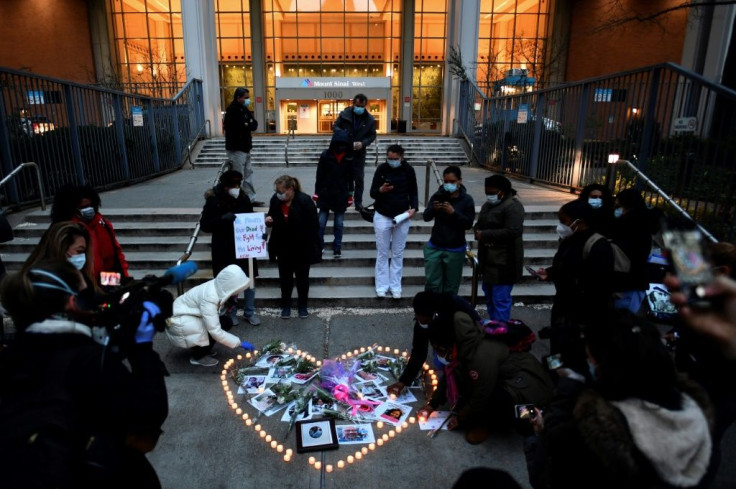Coronavirus US Deaths Top 42,000; Trump Says Death Toll To Be Sharply Lower Than Estimates

KEY POINTS
- America's death toll has crossed 42,100 by 9.30 p.m. ET Monday
- President Trump: 50,000-60,000 people to die of pandemic; lower than earlier estimates
- Georgia Gov. Brian Kemp said that his state will reopen on April 24
- He cited favorable data and more testing as the basis for resuming business
A glimmer of light is starting to show at the end of the dark tunnel. Even as the U.S. struggles with taming the rising graph of coronavirus infections and its grim death toll, President Donald Trump announced a welcome piece of positive news at his White House news briefing Monday (April 20): far fewer people are expected to die of the pandemic in the country than earlier projections had estimated.
The new projections say the coronavirus will claim 50,000 to 60,000 lives -- still a high number, but much lower than the 100,000 figure given by Dr. Anthony Fauci, a member of the White House coronavirus task force and the head of the National Institute of Allergy and Infectious Diseases, last month.
“Now we’re going toward 50 -- I’m hearing, or 60,000 people," Trump said. "One is too many. I always say it. One is too many, but we’re going toward 50 or 60,000 people. That’s at the lower -- as you know the lower (end of the projections) was supposed to be 100,000 people.”
The good news, however distant and small, did not end there. Another welcome trend was becoming discernible in the data. The number of infections recorded Monday, at more than 25,000, seemed to be sharply lower than the 32,500 reported Saturday and 26,900 Sunday, according to a dashboard maintained by the John Hopkins Univeristy. If the trend takes hold, it will offer state governors more maneuvering room in calibrating a rolling reopening of the economy, amid protests from people hit hard by business and job losses.

The death toll from the coronavirus pandemic in the U.S. had crossed 42,000 by 9.30 p.m. ET on Monday, with more than 784,000 people infected so far.
The rising infections have forced some states to extend their stay-at-home orders until the middle of May. But others are moving ahead gingerly to reopen the economy in order to reduce the lockdown's impact on businesses and jobs, despite a shortage of test kits needed to identify and isolate every infected person to prevent a second wave. Georgia Gov. Brian Kemp announced in a press conference Monday (April 20) that the state will resume some business operations Friday.
Experts from the Institute for Health Metrics and Evaluation said that Georgia's death toll reached its peak on April 7 while demand for hospitalization decreased. The previous model for Georgia projected the peak to occur in May.
As of April 20, Georgia has 19,399 coronavirus cases with 775 deaths, per the Georgia Department of Public Health. Of these deaths, 65% had pre-existing medical conditions.Five Georgia counties have more than a thousand cases: Fulton ((2,198), Dekalb (1,521), Dougherty (1,436), Cobb (1,196) and Gwinnet (1,181). Glascock and Taliaferro counties have yet to record their first case.
Vice President Mike Pence, the head of the Trump administration's coronavirus task force, held a call with governors on each state's lab capacity and equipment for testing. "We have enough testing capacity for every state," he said.
Trying to deflect criticism from state governors about the shortage of testing kits to lift restrictions safely, Trump said the governors “didn’t understand” about the testing facilities they could use.
“Some of the governors, like as an example the governor from Maryland, he didn’t understand the list," the President said about a list of facilties the White House provided. "He didn’t really understand too much about what was going on, so now I think he’ll be able to do that. It’s pretty simple.”
As of Sunday evening, Georgia has conducted 84,000 tests. Kemp said the Augusta University, a state medical school, will produce thousands of test swabs daily, and that the Georgia National Guard will do 1,500 tests a day.
"Due to favorable data & more testing, gyms, fitness centers, bowling alleys, body art studios, barbers, cosmetologists, hair designers, nail care artists, estheticians, their respective schools and massage therapists can reopen Friday, April 24 with minimum basic operations," the governor confirmed in a tweet.
Due to favorable data & more testing, gyms, fitness centers, bowling alleys, body art studios, barbers, cosmetologists, hair designers, nail care artists, estheticians, their respective schools & massage therapists can reopen Friday, April 24 with Minimum Basic Operations. #gapol
— Governor Brian P. Kemp (@GovKemp) April 20, 2020
Kemp's decision comes after the White House released new guidelines on reopening the economy. The governor, however, clarified that it will not be "business as usual."
Establishments will need to screen their staff for respiratory symptoms and fever. Employers are also expected to impose strict safety measures, such as social distancing at work stations and wearing face masks and gloves.

The governor also said that businesses resuming operations will need to enhance the sanitation process. Companies are encouraged to implement staggering shifts or "teleworking if possible."
By next Monday, Kemp said that theaters, dine-in restaurants and private social clubs could be open, subject to further mandates that will be released in the following days.
However, amusement parks, nightclubs, bars and establishments with live performances are not yet allowed to resume in the foreseeable future. Meanwhile, the shelter in place order will remain active until 11:59 p.m. on April 30.
"By taking this measured action, we will get Georgians back to work safely without undermining the progress that we have all made in the battle against COVID-19," the governor said.
© Copyright IBTimes 2025. All rights reserved.





















